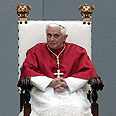
Pope Benedict XVI on Saturday removed restrictions on celebrating the old Latin Mass, reviving a rite that was all but swept away by the liberalizing reforms of the Second Vatican Council.
The decision, a victory for traditional, conservative Roman Catholics, came over the objections of liberal-minded Catholics and angered Jews because the Tridentine Mass contains a prayer for their conversion.
Benedict, who stressed that he was not negating Vatican II, issued a document authorizing parish priests to celebrate the Tridentine rite if a "stable group of faithful" requests it. Currently, the local bishop must approve such requests - an obstacle that supporters of the rite say has greatly limited its availability.
"What earlier generations held as sacred remains sacred and great for us, too," Benedict wrote.
The document upset Jews, since the Tridentine rite contains a prayer on Good Friday of Easter Week calling for their conversion. The Anti-Defamation League called the move a "body blow to Catholic-Jewish relations," the Jewish news agency JTA reported.
The Simon Wiesenthal Center urged Benedict to publicly point out that such phrases "are now entirely contrary to the teaching of the church."
The old prayer, contained in the 1962 missal of the Tridentine rite, read: "Let us pray also for the Jews that the Lord our God may take the veil from their hearts and that they also may acknowledge our Lord Jesus Christ. Let us pray: Almighty and everlasting God, you do not refuse your mercy even to the Jews; hear the prayers which we offer for the blindness of that people so that they may acknowledge the light of your truth, which is Christ, and be delivered from their darkness."
The prayer used in the New Mass according to the Pope Paul VI missal reads: "Let us pray for the Jewish people, the first to hear the word of God, that they may continue to grow in the love of his name and in faithfulness to his covenant. Almighty and eternal God, long ago you gave your promise to Abraham and his posterity. Listen to your church as we pray that the people you first made your own may arrive at the fullness of redemption."
Christians fear division
In addition to Jewish concerns, bishops in France and liberal-minded clergy and faithful elsewhere expressed concerns that allowing freer use of the Tridentine liturgy would imply a negation of Vatican II and create divisions in parishes since two different liturgies would be celebrated.
Benedict said those fears were "unfounded" in a letter to bishops accompanying the Latin text.
He said the New Mass remained the "normal" form of Mass while the Tridentine version was an "extraordinary" one that would probably only be sought by a few Catholics.
The document "doesn't impose any return to the past, it doesn't mean any weakening of the authority of the council nor the authority and responsibility of bishops," Vatican spokesman Rev. Federico Lombardi said.
However, Cardinal Jean-Pierre Ricard, the head of the French bishops' conference, warned that the move will create divisions. "There will be resistance from both sides," he told Le Monde.
The liberal lay church group We Are Church said that the move represented a step back from Vatican II and could set an even more conservative direction for the church. It warned of a "new split within many parishes, diocese and finally the entire Roman Catholic Church."
"It is to be feared that while it appears to only be about the old Mass, in reality it is an attempt to set the Catholic Church on a new old course," the group said.
Ricard, speaking on France-Info radio Saturday, said the move does not mean the entire church is becoming more fundamentalist. "Just because you have in a family a cousin who is a bit different, whom you tolerate and accept, doesn't mean that the whole family adopts his positions or his way of life," he said.















